
Exposé Online
What's old
Exposé print issues (1993-2011)
- 1 (October 1993)
- 2 (February 1994)
- 3 (May 1994)
- 4 (August 1994)
- 5 (October 1994)
- 6 (March 1995)
- 7 (July 1995)
- 8 (November 1995)
- 9 (March 1996)
- 10 (August 1996)
- 11 (February 1997)
- 12 (May 1997)
- 13 (October 1997)
- 14 (February 1998)
- 15 (July 1998)
- 16 (January 1999)
- 17 (April 1999)
- 18 (November 1999)
- 19 (May 2000)
- 20 (October 2000)
- 21 (March 2001)
- 22 (July 2001)
- 23 (December 2001)
- 24 (April 2002)
- 25 (September 2002)
- 26 (February 2003)
- 27 (August 2003)
- 28 (December 2003)
- 29 (April 2004)
- 30 (September 2004)
- 31 (March 2005)
- 32 (September 2005)
- 33 (May 2006)
- 34 (March 2007)
- 35 (January 2008)
- 36 (October 2008)
- 37 (July 2009)
- 38 (July 2010)
- 39 (Summer 2011)
Features
Taking Prog to the Majors —
The Echolyn Interview 1994
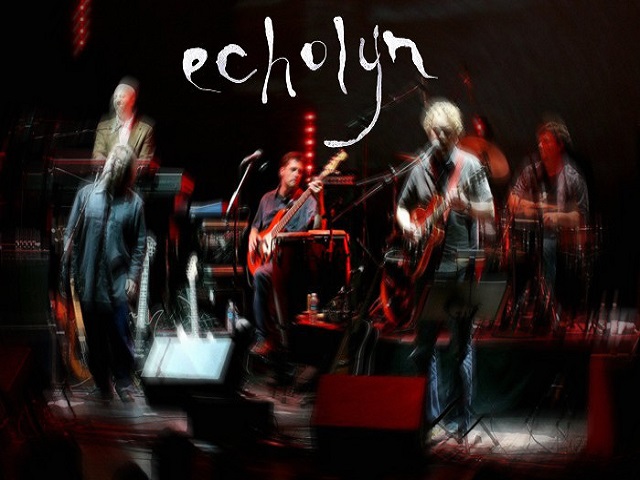
The scene: a hotel room on the seventh floor at the Hollywood Metropolitan hotel, in the early morning hours of November 6th, after an outstanding performance at the Variety Arts Theater on the first day of Progfest '94. Ray Weston and Chris Buzby talk candidly about their music and experiences with a subset of the Exposé writing staff. All the while a loud party is going on at the other end of the hotel room...
by Peter Thelen, Rob Walker, Mike Borella, Published 1995-03-01
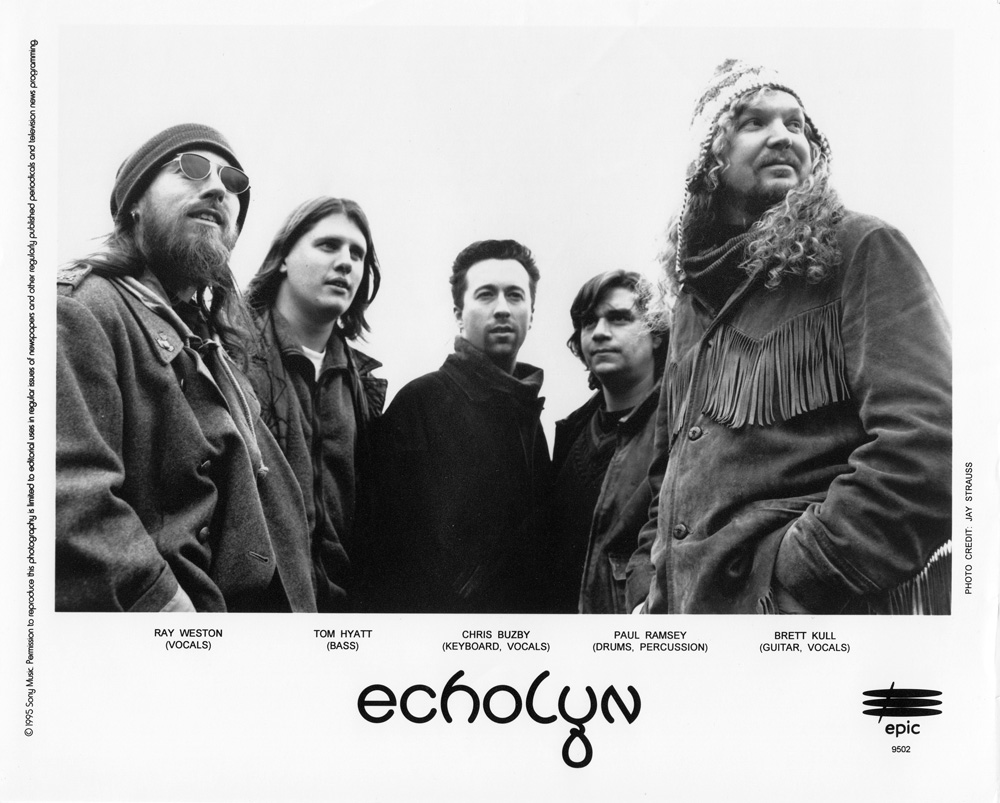 MB: Why "Echolyn"? What does it mean?
MB: Why "Echolyn"? What does it mean?
Ray: Brett came up with the name of the band. His thinking was just something that would represent the music — when you heard the name Echolyn, you would think of the music alone and not something else that would take your thought away from what we were really trying to do.
Chris: It's just the music of five guys...
MB: ...Unlike something like the Dead Kennedys where you have some sort of...
Chris: Yeah, right... (laughs)... no political or theological statement, just five guys creating music.
MB: With the new album, musically what were the themes that you were trying to improve upon or change...
Chris: Well, there were two attitudes — one musical and the other lyrical, and obviously, combined they make an album. I think musically we went in and just tried to create something that worked as an album as a whole — there's a beginning, a middle and an end. We didn't write the album that way — every song took on its own character, and at the end we pieced it together. I think what we were mainly after is trying to capture all the parts of Echolyn. You've got your very intense in-your-face kind of sections, you've got your delicate instrumental breaks, there's strings, there's flute, there's three-part vocals, keyboards with drums, vocals with nothing — again it's just trying to capture all those elements.
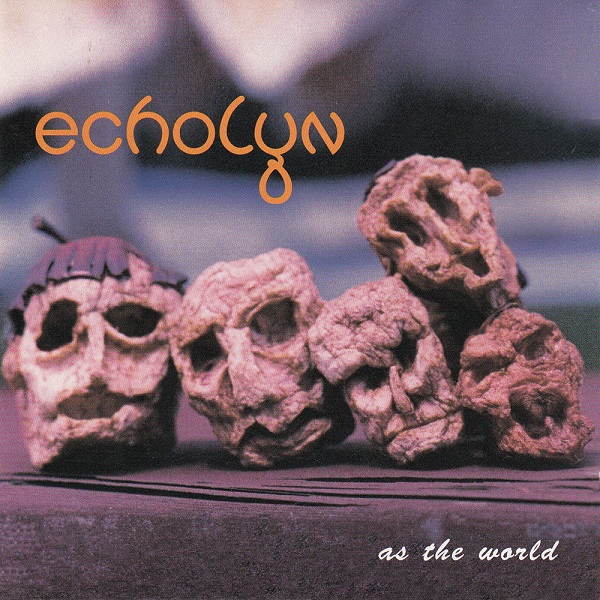 Ray: Lyrically we had certain ways we wanted to go, but the strength of this CD really lies in the work we put in doing a lot of the two- and three- part harmonies, just the actual vocal work we did on it — more than anything else we've ever done before we really strived for the correctness of certain things...
Ray: Lyrically we had certain ways we wanted to go, but the strength of this CD really lies in the work we put in doing a lot of the two- and three- part harmonies, just the actual vocal work we did on it — more than anything else we've ever done before we really strived for the correctness of certain things...
Chris: We did. We really pushed ourselves. We spent three months in the studio in Nashville, and vocally I think we really have pushed the limits of what vocals can be in rock and pop music. I personally think certain songs will work on radio. They weren't written that way, it's just that the flavor and the feel, to me they define our style — it's pushed us more in that direction that is more Echolyn and not really anyone else.
MB: So do you think now, with a major label contract, you'll be on the radio and touring more or less...
Chris: Definitely touring. In terms of radio play, I would say [it's] nothing to guarantee. It's the type of thing that... if it's gonna happen, it will happen. If we're out there touring and we all the sudden hit a hundred thousand albums, they're gonna say, "Well, these guys have something to offer," and that will catch on, and maybe radio will become a part of that. MTV might become a part of that. We're obviously not about style, fashion, and the whole MTV thing right now, so we're kind of out in left field.
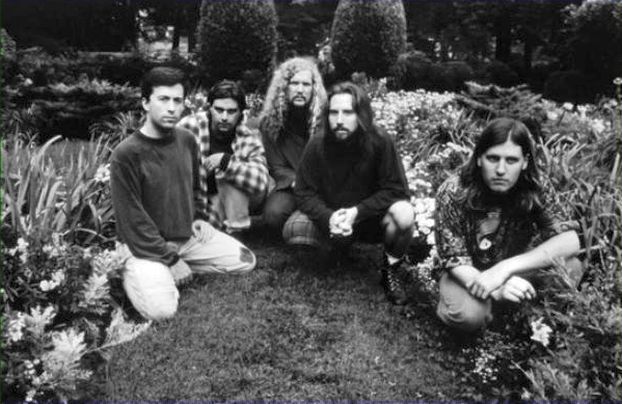 RW: So the label has plans for you? Have they discussed with you what they see your future as?
RW: So the label has plans for you? Have they discussed with you what they see your future as?
Ray: Yeah, in fact we had a talk here tonight with one of the guys, vice- president of marketing was there to see us play for the first time, and we were able to just sit down in our dressing room and hash out some ideas that we had, some things that he knows are gonna happen, and he spoke realistically, we have a lot of things that we think should happen, and they have a lot more control — really — [over] what's gonna happen, in a positive way...
Chris: Really... It's positive and exciting, it's like we've got this distribution center where we can be in every zip code, in every county in America, like that (snaps fingers). That is why we decided to sign with a major. We didn't have to change a note or a lyric on this album. If you listen to our demos before we did the album, they are 99.5% the same, which we pride ourselves on.
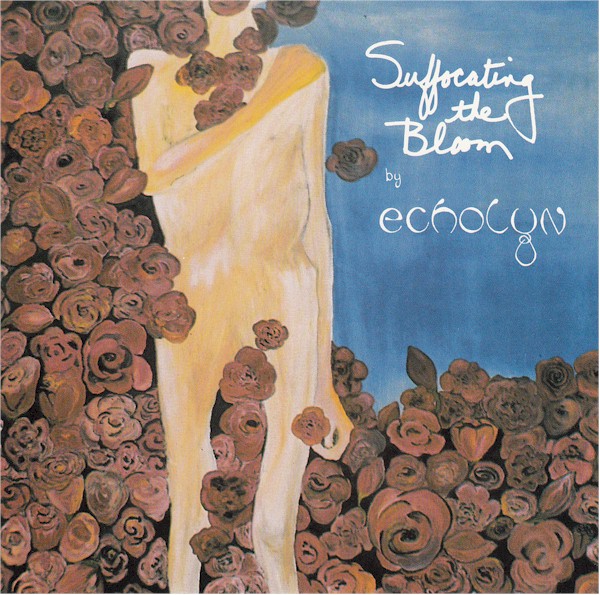 JS: There were rumors floating around, maybe on the internet, that Sony, your label...
JS: There were rumors floating around, maybe on the internet, that Sony, your label...
Chris: ...Was going to put us on an independent...?
JS: ...Had said "OK, you did your thing, now we want you to go commercial." Was there anything at all to that rumor?
Chris: No, no... not at all
JS: ...And assuming that it's not true, can you expect that Sony will eventually come to you and say "Hey, what you're doing is not commercial enough."
Chris: Let's put it this way. If Sony comes to us and says that, then we're either Echolyn with Epic Records or we're Echolyn without Epic Records. There's no reason to change... we'll do what we want to do and they'll drop us.
Ray: Right.
Chris: ...And that actually is a triumph on our part, because if we're still doing what we want and it's not what they want, then obviously businesses clash and the dollar sign doesn't equal, and we're doing our own thing again.
JS: Why do you think Sony was interested in a band like Echolyn?
Ray: There was a rumor, that was told to us, that Michael Kaplan — our A&R guy, was trying to put together UK again, he was trying to get all the super- bands back together, and they were like... well, these pretentious and pompous attitudes were clashing all over the place with these guys...
Chris: All the band members didn't want to work with each other...
Ray: So they thought maybe they could find somebody young, grass roots, and start this whole revival thing back again... and our CD landed on his desk at just the right time.
 JS: So do you think the industry might be trying to cash in on a resurgence of prog?
JS: So do you think the industry might be trying to cash in on a resurgence of prog?
Ray: Yeah.
Chris: I wouldn't even say 'prog,' I mean we've been saying all this weekend that a lot of what we do I don't think is just progressive, I think a lot of what we do is just honest. It's music that is written from the heart, it has a strong lyrical content to it, that believes in being yourself, not putting any pretensions behind what you do. Musically, it's theme and variation, it's classical music at it's best in the sense that every idea belongs with the one previous. And they're smart — Sony is, I mean they're not the biggest company in the world for nothing. If they jump on something now, and we become the next biggest thing, Sony is that much bigger for finding us.
JS: But in the record and radio world, everything has to fit a niche, everything has to fit a demographic, everything has to...
Chris: ...It does if it's going to sell, but it doesn't when it's new.
Ray: They've just dropped a big stone in the water right now, and they're watching the ripples, seeing which way it rolls. Demographically, they're just gonna wait, the guy tonight told us they're not really worried about album sales or airplay, they're going to put it in the markets where we have proven ourselves.
 Chris: We're like a science project to them, and for us that's the best challenge we could ever come up against. They're going to drop us out there and see what happens, and our job is to prove to every one of you that we can do what we do on our albums live, maybe even better. So for us, that's a challenge we have to live up to every night; for them, they're saturating the market with something so different and so new, that it might actually make some people's heads spin. And if it's not making their heads spin, it's at least making them go, "Alright, maybe I don't like this, but I'm respecting the fact that it's different." And this is my belief, and it has nothing to do with Sony, but here we stand six years before the millennium, what is going to be the course of twenty-first century music? History has always proven that the newest thing happens within ten years of the century change. Maybe we're a part of that, maybe we're not, but we're at least trying to be ourselves in the sense that we're writing and creating a music that hopefully will become like a universal thing — you've got the classical, the jazz, the three-part harmony, the sincere lyrics, the honesty...
Chris: We're like a science project to them, and for us that's the best challenge we could ever come up against. They're going to drop us out there and see what happens, and our job is to prove to every one of you that we can do what we do on our albums live, maybe even better. So for us, that's a challenge we have to live up to every night; for them, they're saturating the market with something so different and so new, that it might actually make some people's heads spin. And if it's not making their heads spin, it's at least making them go, "Alright, maybe I don't like this, but I'm respecting the fact that it's different." And this is my belief, and it has nothing to do with Sony, but here we stand six years before the millennium, what is going to be the course of twenty-first century music? History has always proven that the newest thing happens within ten years of the century change. Maybe we're a part of that, maybe we're not, but we're at least trying to be ourselves in the sense that we're writing and creating a music that hopefully will become like a universal thing — you've got the classical, the jazz, the three-part harmony, the sincere lyrics, the honesty...
Ray: ...The aggression.
Chris: Yeah, the aggression... I mean it's everyday life. Our new album deals with everything from being so pissed off to being so happy, it's all there — the emotions, I mean we all go through it every day.
RW: How many albums is the contract for?
Chris: Seven.
MB: What made you do seven, was it your choice?
Chris: Actually, they wanted ten to start, we talked them down.
Ray: They said ten, we said five, so we kind of met them half way.
Chris: The thing is for them, with seven albums, if we become huge and we're making money, they'll want to keep us. And if we don't become huge, then we're gone, we're a write-off...
Ray: ...Well, maybe not gone...
Chris: (laughs) Yeah, not gone, but you know what I mean... discount...
MB: Lots of compilations (laughs)
Chris: Exactly. Best of Echolyn, volume two. (laughs)
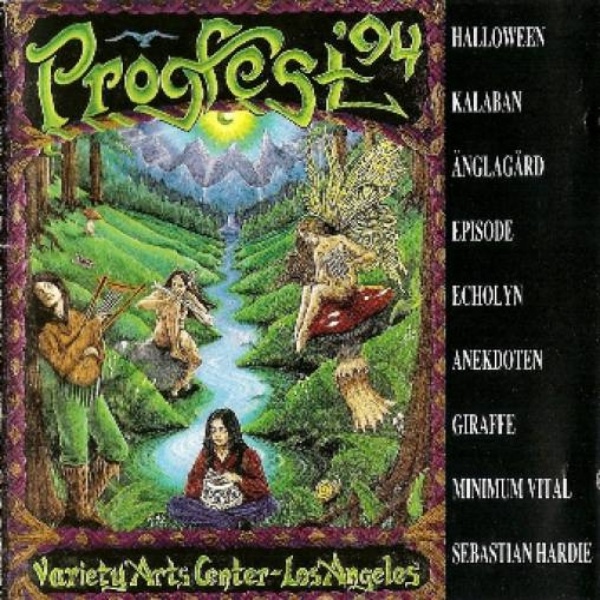 RW: So is there any plan to release a live album?
RW: So is there any plan to release a live album?
Chris: Eventually we'd like to do that. Our contract of the seven does not include any live albums. It'll happen. Obviously a live show, to us is a crucial part of who we are, it captures the essence of what the studio kind-of gets. The studio gets ninety percent, but that extra ten percent you can't touch, you can't buy.
Ray: A lot of times in the studio we would think that the emotions were there, peaking at some points, but the guy would say, "No, that wasn't it."
Chris: Our producer.
Ray: And then live, I do the same exact thing that I thought was it and he said it wasn't... for me, it is. But... I guess there's a special term you use, like "over the top." [He would say] "I don't know... for the album you're just a little over the top, tone it down a little bit... hit the same notes, try and get the same emotion, but just bring it down a little bit."
Chris: It's intensity, energy, vibe. I mean there were times I played my keyboard parts one hundred percent right five times in a row... like I got all the notes, and he'd go, "Yeah, but you didn't get the song right," and it was like... alright, I'll try it again. We saved every track, it was one of those things where our producer would feel happy with it, I'd walk in — these guys would have their favorite picked out because they had already heard all of them, then I would have to objectively sit back and listen to this one, that one... I mean everybody's got their opinion, someone's gonna like something better than the next, and that's where Echolyn becomes Echolyn, we choose democratically what is and what isn't.
MB: Seems like back in the 60s and 70s people would come out with two albums a year, now it's like one every three years if you're...
Chris: Yeah. The hard thing is touring. We're already kind of bummed because these songs to us are a year old already, and it's not even coming out for another three months, and then we're gonna have to tour on that album for another year or year and a half, so by the time we come up with a new album... yeah, it'll be almost three years. That's frustrating for us, very frustrating because we have new songs we're working on that we want to put into the rotation full time, but we don't have the time to finish them.
Ray: We have two songs, one I have words for, I've got them written down and I've got a melody in my head, and we've got another one that we just finished that I'm not even gonna attempt to put anything to now because... it's not time. We've just gotta hit right. This one might be one seventy minute song.
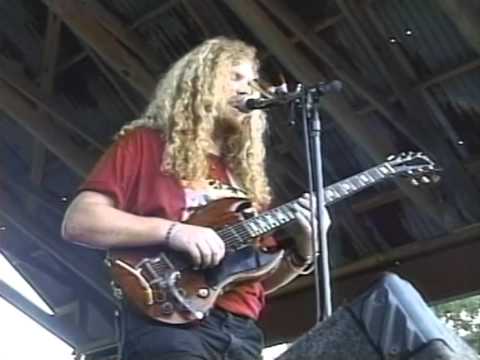
Chris: Yeah, this album looks like it's turning into something... big. Maybe two tracks, seventy minutes in all. It's hard, but like we're working on different songs right now but already we see a theme, musically shaping. And myself, two of the parts I'm working on, one of the ideas was actually Brett's original riff, which as a band we worked on. The second song is a song of mine, which we just started on this past week, and I've already purposely planted parts in the new song so that if we do piece them together it'll work. So we'll see. For now we can't say what it's gonna be, but I'll guarantee you it'll be better than the one we just put out. I already know that (laughs), it's pretty exciting right now. It's like I said these other songs are a year old to us, so this new stuff is pushing us, it's exciting.
Ray: And it makes it frustrating if you can't do it...
Chris: ...And we don't have the time. We were spending the last two weeks working on this new song, and then we had to rehearse for today, so we had to stop right in the middle of it, it was like... put the brakes on.
MB: Is this your first West Coast show?
Ray: Yeah.
Chris: This is the furthest west we've ever been! And also the first time we've ever flown as a band.
Ray: That was an experience.
Chris: It was. (laughs from both)
MB: So up till now what's kept you off the West Coast?
Chris and Ray: Money. (lots of laughs)
Chris: Honestly!
MB: So is the company fronting the...
Chris: Yeah, they paid for the whole trip. They wanted us to be here.
Ray: An actual and honest reason to come out and do it, I mean we could've said, "We want to fly out to San Diego and play." And we'd say why? What are you gonna do in San Diego that you haven't done in Philly.
Chris: But a festival like this...
Ray: (interruption) You're a beautiful man, Mr. Tom Hyatt (as Tom brings Ray another beer). Is there a bottle opener over there? (Ray disappears)
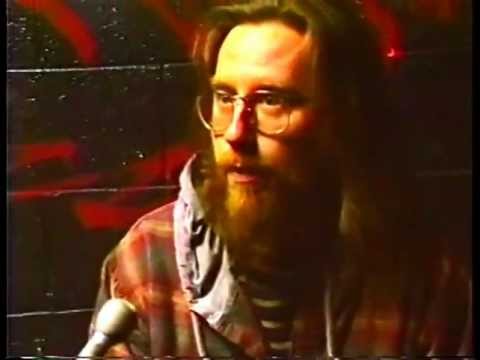
Chris: ...Is the best place we could be. This is just a great opportunity. Obviously the fans, everyone that was here... is so receptive to this. And the guy that was here tonight, he's vice president of marketing for Sony, West Coast, just sat [in the audience], and he was just floored. One — by us because he'd never seen us play before, and two — by the fan response. He said usually you spend your time as a representative of a record company sitting with the "suits," you get your free comp ticket, you walk in, you check 'em out, whether you like it or not — you're there, you turn in a report that says, "Yeah, they're cool, sell albums, whatever, bye." He said tonight was the first time he could just be himself and randomly plop down in an empty seat. [He was] blown out. [The fan response] put him into it, so it proved to him that this really could happen. And we knew it too, coming in here tonight, there's a lot of people that have heard of us, but I think most people haven't heard of us. If you took statistics I think it might have been forty percent to sixty percent. Maybe they had heard of our name, but hey, that's what it's all about, and that's why to us our live show is more important than our albums. Our records are something for you to take home, but our live show is something that every time you can experience in a different way. Like every night we change our set list, totally different. It keeps it fresh for us so we don't get stale, and if you're gonna come and see us two nights in a row, I don't want you to have to see the same songs every night...
Ray: ...And we have enough songs to play...
Chris: We've got so much music now, it's actually hard to pick setlists. And you get the one fan that comes to the show and wants to hear a certain song, and we just played that last night, and there's a hundred people here that were at that show... well, they already heard it, but you didn't. So... sorry, we have to go through it... (Some general confusion and interruptions) For us the live thing is a piece of history, every concert is a piece of who we are, because we cover all those albums... we cover everything. (Things get really rowdy for a few minutes, we discuss taking the interview out into the hall, but things finally settle down a little. Somewhere in the confusion, Ray finally disappears for good.)
PT: What becomes of the back catalog now that you're signed?
Chris: Well, we can't sell it now. Sony owns all the rights to our back catalog, it will be re-released down the road, I would speculate no sooner than a year... only because they're going to want to support the new album obviously. But if anything they could just drop them in the catalog, and a fan who likes the new stuff might go out and say, "Wow, what's this?" And maybe buy the older stuff. We thought that would be a smart move, again because of distribution. We can't get to every zip-code in America, let alone Canada, Europe and Japan.
MB: So you're full time musicians now?
Chris: Full time, and starving musicians (laughs), it makes it more rewarding, though.
MB: So when you were independent, it was pretty much work eight hours a day, go home, practice...
Chris: Right. Full time jobs. I was a schoolteacher, I taught at my old high school, I was head of the jazz band and chorus. We would rehearse three nights a week — Tuesday, Wednesday, and Thursday, from six to ten, again squeezing in all the time we could. I miss teaching, not only for the salary, but for the teaching aspect of it, it's a great experience. But I'm gonna go back to it, get my masters and doctorate in composition eventually. This, to me, is a springboard, this is going to open many doors for all of us as a band and individually. So it's important for me to still keep meeting people, shaking hands.
RW: Just curious about how you develop the songs, especially the new tunes. Like some of the new tunes I heard tonight, there was even more of a canon, and just the harmonic and structural elements...even moreso than some of the older stuff...
Chris: Yeah. I'm glad that you picked that up on one listen.
 RW: So how refined are the ideas or the sections you bring in, before you work them out as a group?
RW: So how refined are the ideas or the sections you bring in, before you work them out as a group?
Chris: Personally, when I present a song to the band, it's usually about an eighty percent completed form. A lot of times I write the guitar parts out... I don’t tell him that's what he has to do, it's just that when you have an idea and something in mind... I also do a lot of the vocal harmonies; to me that is a major trademark of Echolyn. We don't sing in just thirds and fourths, we do major seconds and minor seconds, we do cross-voicing, I'll start lower than Ray, and then Ray and I will switch, where Brett's just still doing a line over the top of it. It's a trademark we started on some of the earlier albums, and we're definitely pursuing it on this one. Again, musically, theme and variation all throughout, retrograde, inversion, transposition, even rhythmic stuff... just taking a simple idea, rather than trying to come up with twenty ideas that are different, take the one idea and augment that, spread the rhythm out in double time, condense it, do whatever you need to do to take that musical idea... again, it's a very classical form of writing, all the greats did it — Mozart, Beethoven, Bach, Stravinsky, Bartok... I mean all these guys that I've studied, it's like make the most of what you have. Don't write one little idea and then come up with some other little riff to tie in with it — we do that too, but there's also so much you can do with a simple riff and turn that into a good song. There are several songs on the album, but one in particular, it's the second to the last song, it's two chords — yet it's a six minute song. Yet if you listen to the song you won't know it's just two chords all the way through, it's two chords that are varied all the way through, there's melodies put in front of them, they're reharmonized, I changed the inversions, and all the way through it's just a whole new thing. Again, that's all part of it, and it's very conscious — nothing we do is random, we spend many many hours arranging. That's the biggest thing, actually. A song might have all the ideas it needs within a day or two, but the arrangement is crucial because you have to make it feel right, everything's gotta have it's place, it's gotta fall where it belongs, and that's where we spend a lot of time. I'm glad you picked a lot of that up, though, it means a lot to me because I've spent a lot of time thinking about it.
RW: It must be a real luxury to have the three of you who can sing so well.
Chris: Yeah, it really helps.
RW: Do you guys have perfect pitch?
Chris: No, none of us do — which is actually good, because sometimes that's a hindrance...
RW: Your harmonies are not easy by any stretch of the imagination, sometimes as weird chords over something else that you're playing...
Chris: That's the thing too, and it's another whole challenge. A lot of times — and I ran into this in the recording studio, a lot of what I sing has nothing to do with what I play. I spend a lot of time when I'm playing and singing live picking my notes out of the center of chords that I'm playing. When we got to the recording studio and I was all of a sudden just standing there just singing, it's very hard to do. I was trying to find notes that weren't even there. Again, it's just pushing yourselves to that limit where...
RW: So is that something you've been able to develop?
Chris: Oh yeah. Honestly, we have spent a lot of time on it. I'm not going to say it came easy because it didn't. But again, when you pull it off during a show, it makes all that work pay off. And when you don't pull it off, then you go back to work again (laughs).
MB: Do you think you're going to be pushing yourselves in the future?
Chris: Yeah, we already are with the new stuff. Most of this new song — I mean I wrote it but I can't play most of it yet. I wrote some parts that I just can't physically do yet just because it's a challenge for me. It's a challenge for me to go into the studio and try to do something I can't do, I wrote it at half speed and I'm just trying to teach my hands how to do it... and there's still something we do live now, I get into a solo section and it's like... help me get it, this will be a miracle! (laughs) But hey, I'd rather have that than — I don't know how many bands go through this, but to me it means that much more, when I get through a passage that I've taken the time to write and taken the time to challenge myself and I pull it off right, then the reward is that much higher. For me, the challenge is the reward, that's what makes the live performance such a good thing. In the studio you can cover your mistakes, but live you can't do that. I always try and write to the cusp of where I can barely make it, and (laughs) some nights I do, and then other nights it's like... I mean there's been times when I'm playing and I'm like — oops, and everyone knows, but like hey, we're human, what the heck.
Note: It's really hard to find pictures of a band from more than a decade past (to keep the article reasonably consistent for time period), so if you own any of the images used, please let us know and we'll make arrangements. Or if you have any pictures of Echolyn from this period, let us know and maybe we can cooperate on this. - ed.
Filed under: Interviews, Issue 6
Related artist(s): Echolyn
What's new
These are the most recent changes made to artists, releases, and articles.
- Review: Sterbus - Black and Gold
Published 2026-03-03 - Release: Janel Leppin's Ensemble Volcanic Ash - Pluto in Aquarius
Updated 2026-03-02 15:06:51 - Release: Janel Leppin - Slowly Melting
Updated 2026-03-02 15:05:27 - Release: Alister Spence - Always Ever
Updated 2026-03-02 15:04:11 - Release: Let Spin - I Am Alien
Updated 2026-03-02 15:02:41 - Review: Falter Bramnk - Vinyland Odyssee
Published 2026-03-02 - Review: Exit - Dove Va la Tua Strada?
Published 2026-03-01 - Review: Steve Tibbetts - Close
Published 2026-02-28 - Release: We Stood Like Kings - Pinocchio
Updated 2026-02-27 19:24:02 - Release: Stephen Grew - Pianoply
Updated 2026-02-27 19:20:11 - Release: Thierry Zaboitzeff - Artefacts
Updated 2026-02-27 00:16:46 - Review: Kevin Kastning - Codex I & Codex II
Published 2026-02-27 - Release: Zan Zone - The Rock Is Still Rollin'
Updated 2026-02-26 23:26:09 - Release: The Leemoo Gang - A Family Business
Updated 2026-02-26 23:07:29 - Release: Ciolkowska - Bomba Nastoyashchego
Updated 2026-02-26 13:08:55 - Review: Immensity Crumb - Chamber Music for Sleeping Giants
Published 2026-02-26 - Release: The Gatekeepers - Diary of a Teenage Prophet
Updated 2026-02-25 15:55:58 - Listen and discover: Mordecai Smyth will not break your back
Published 2026-02-25 - Review: Mars Lasar - Grand Canyon
Published 2026-02-25
